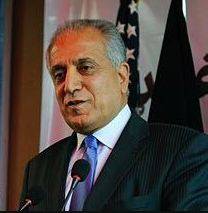Washington (Agencies): US special envoy Zalmay Khalilzad has embarked on a two-week tour of Afghanistan, Pakistan, India and China for talks with each country's leadership on the Afghan peace process.
“Leaving Washington again to continue my work towards facilitating a negotiated settlement to the conflict in #Afghanistan. This time to #India for the @raisinadialogue, as well as Afghanistan, #China, and #Pakistan:,” the US special envoy said in a tweet.
Leaving Washington again to continue my work towards facilitating a negotiated settlement to the conflict in #Afghanistan. This time to #India for the @raisinadialogue, as well as Afghanistan, #China, and #Pakistan: https://t.co/TtXLTGIRLm
— U.S. Special Representative Zalmay Khalilzad (@US4AfghanPeace) January 9, 2019
In a media note, the US Department of State also confirmed on Tuesday that the envoy will be leading an interagency delegation to the region from January 8 – 21.
“He will meet with senior government officials in each country to facilitate an intra-Afghan political settlement,” the state department stated, adding that the, United States supports the desire of the Afghan people and the international community for a political settlement that ends the 40-year conflict and ensures Afghanistan never again serves as a platform for international terrorism.
“Special Representative Khalilzad will meet with Afghan government officials and other interested parties to support and facilitate an inclusive peace process in Afghanistan, empowering the Afghan people to chart a shared course for their nation’s future.”
The state department stated that Khalilzad continues to coordinate his efforts with President Ashraf Ghani, Chief Executive Abdullah Abdullah, and other Afghan stakeholders to ensure an intra-Afghan peace process.
“The US goal is to promote dialogue among Afghans about how to end the conflict, and to encourage the parties to come together at the negotiating table to reach a political settlement where every Afghan citizen enjoys equal rights and responsibilities under the rule of law.”


